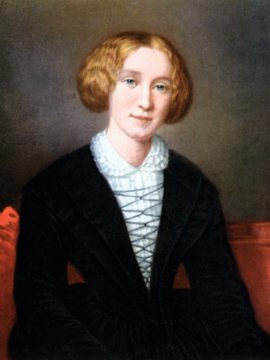Johanna Thomas-Corr at The New Statesman:
 Eliot’s humanism tends to inspire awe in her readers. “She seems to care for people, indiscriminately and in their entirety, as it was once said God did,” wrote Zadie Smith in a 2008 essay on Middlemarch. As it was once said God did. My first thought is of Middlemarch’s omniscient narrator: sage, a little sarcastic, a little judgemental as she tunes into the thoughts of each character, catching them in the act of realising something about themselves.
Eliot’s humanism tends to inspire awe in her readers. “She seems to care for people, indiscriminately and in their entirety, as it was once said God did,” wrote Zadie Smith in a 2008 essay on Middlemarch. As it was once said God did. My first thought is of Middlemarch’s omniscient narrator: sage, a little sarcastic, a little judgemental as she tunes into the thoughts of each character, catching them in the act of realising something about themselves.
But when Smith talks about Eliot being like God, what she means is that Eliot was “so alive to the mass of existence” that she conferred as much attention on her mediocre characters as she did on her more admirable ones. Smith’s essay is a sort of riposte to Henry James’s 1873 review of Middlemarch, in which he argued that Eliot should have focused her energies on Dorothea, who “exhales a sort of aroma of spiritual sweetness”, rather than lingering so long on the feckless horse-trading Fred Vincy, “with his somewhat meagre tribulations and his rather neutral egotism”.
more here.
